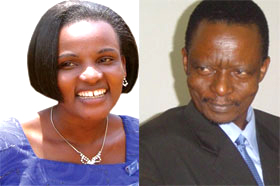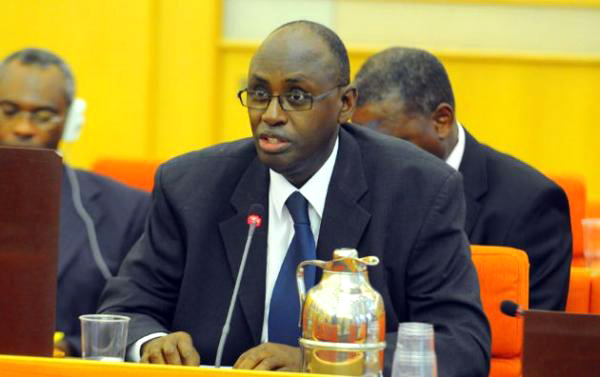Museveni and his son
Elsewhere, the U.S. has seen a son (George Walker Bush) and father (George Herbert Walker Bush) in the White House as 43rd and president respectively. Until recently, another Bush, Jeb – a former governor of Florida, was in the running for the White House.
In the current U.S. presidential race, former First Lady Hillary Clinton is a strong contender to become president just a few years after her husband, Bill Clinton. America has also had other well-known powerful political families, including the Kennedys, the Tafts, and the Rockefellers.
In Peru, Keiko Fujimori, the daughter of former president Alberto Fujimori (1990 -2000) is a strong contender to the job.
The apparent stranglehold of powerful families on political constituencies has proved to be both controversial and interesting. In America, debate around them has spawned websites like www.bushandclintonforever.com and headlines like `Stop Hilary. Vote no to a Clinton dynasty’ in a November 2014 Harper’s magazine essay.
One commentator wrote: “I’ve got no problem calling Jeb Bush a dynastic candidate. Jeb’s great-great-great grandfather, Samuel P. Bush, was a wealthy industrialist who hobnobbed with presidents and politicos. His great-great grandfather, Prescott Bush, was a U.S. Senator. His grandfather, George H.W. Bush, was president. His brother, George W., was president. Jeb’s son, George P. Bush, is eyeing a political career.
Jeb’s political career is unimaginable without the contacts, power, and prestige handed down to him, through no fault of his own, by generations of earlier Bushy pols. He’s a creature of his bloodline. That’s what `dynastic candidate’ should mean.
Analysts say politicians who inherit the position from their family members have a greater advantage over their opponents because they already have social capital accumulated over time and support groups on their side. Many inherit vote soliciting machines from their next of kin which help them beat the queues of challengers.
In Uganda, this trend is increasingly making it difficult for ordinary Ugandans with vision to succeed politically.
The issue of dynastic politics gained currency after the former head on Security Agencies, Gen. David Sejusa, alleged that President Yoweri Museveni was grooming his son, Brig. Muhoozi Kainerugaba to succeed him as president. Museveni has denied the allegation and insisted that he cannot install his son as Uganda is not a monarch but a democracy in which leaders are elected. That does not mean Brig. Muhoozi cannot run for office and be elected. Already the family has First Lady Janet Museveni occupying a ministerial position and Museveni’s younger brother, Gen. Caleb Akandwanaho aka SalimSaleh, wielding immense political power albeit informally.

Democracy deficit
It is against this background the rise of the Akenas, Rwabaramiras, and Nanyondos on the lower parliamentary constituency level is raising questions about what is promoting it and what it means for the country.
For James Magode Ikuya, an elderly NRM historical, this trend shows a general decline of politics.
“Politics has become so senseless that issues no longer matter,” he told The Independent, “Now it’s based on useless things like money and emotions.”
According to this view, some politicians are now using their backgrounds and wealth to automatically get a slot in parliament.
Makerere University political historian, Prof. Mwambutsya Ndebesa, says the trend shows there is a “democracy deficit”.
“Apathy has gone from not just voting to a general feeling that whatever voters do, nothing is likely to change,” he says.
He worries this trend could take the country “back to the monarchical days”. That is possibly an exaggeration, but the professor’s claim that “it’s dangerous that voters are increasingly borrowing leaders from history to fix today without looking at whether someone stands for the same values as their relatives” is not.
While he says this is not a new phenomenon, the professor warns that it’s dangerous that voters are increasingly borrowing leaders from history to fix today without looking at whether someone stands for the same values as their relatives.
“People make judgments depending on what they have seen in the media. There’s a tendency to support what is familiar to them regardless of the skill. They don’t look at values one holds,” he says.
Despite such criticism, political dynasties continue to be mooted across the political isles. Many don’t see a problem – even among the opposition. It seems there are well-planned moves for MPs to prepare a particular brother, sister, wife, daughter or son to succeed them.

In the recently concluded election, retiring Makindye West MP Hussein Kyanjo fronted his son, Farouk Kyanjo, to succeed him. He lost. When asked about this, Kyanjo who was very critical of President Museveni when talk about grooming Muhoozi for presidency broke, was quick to defend himself. He said his son was the only one strong enough to carry the flag of his Justice Party (JEEMA) since he had initially asked other members to take the offer but turned it down.
In Busiro South constituency, DP’s Joseph Balikuddembe did not contest again but his brother, Steven Ssekigozi, tried to succeed him with little success.
Now Magode-Ikuya says he wants limits placed on politicians seeking to succeed their next of kin. No one should automatically inherit an electoral seat without showing ability to perform. So far, there have been complaints that those who take after their relatives end up disappointing their constituents when they fail to perform to the level of their predecessors.
But Mwambutsya says Magode-Ikuya’s bars cannot be easily introduced because “privatisation of the economy has turned public affairs into private affairs”.
“People are increasingly pursuing their survival at a private level and are rather unbothered by higher values of critical thinking,” he says.
Another NRM strongman who preferred anonymity says the problem in Uganda is that people can now vote in leaders but they can’t vote them out since it’s the ‘big guns’ that offer direction on who should be voted.
“It’s no longer about society,” he said, “The mere idea of just one person wanting to do it all shows a problem.”
He says creation of `political gentry’ is likely to cause havoc in society as soon powerful families could start colliding and deteriorate into warlords who can hire society to do their will. He says it happened during the Obote II regime where Acholi and Langi started running Uganda without caring what people’s thoughts were. He says President Yoweri Museveni and his NRM wanted to restore deliberate social empowerment and raise the level of politics. He appears to say that has not been achieved.
 The Independent Uganda: You get the Truth we Pay the Price
The Independent Uganda: You get the Truth we Pay the Price



Paradox!
Now guess, who gave Museveni the votes!!